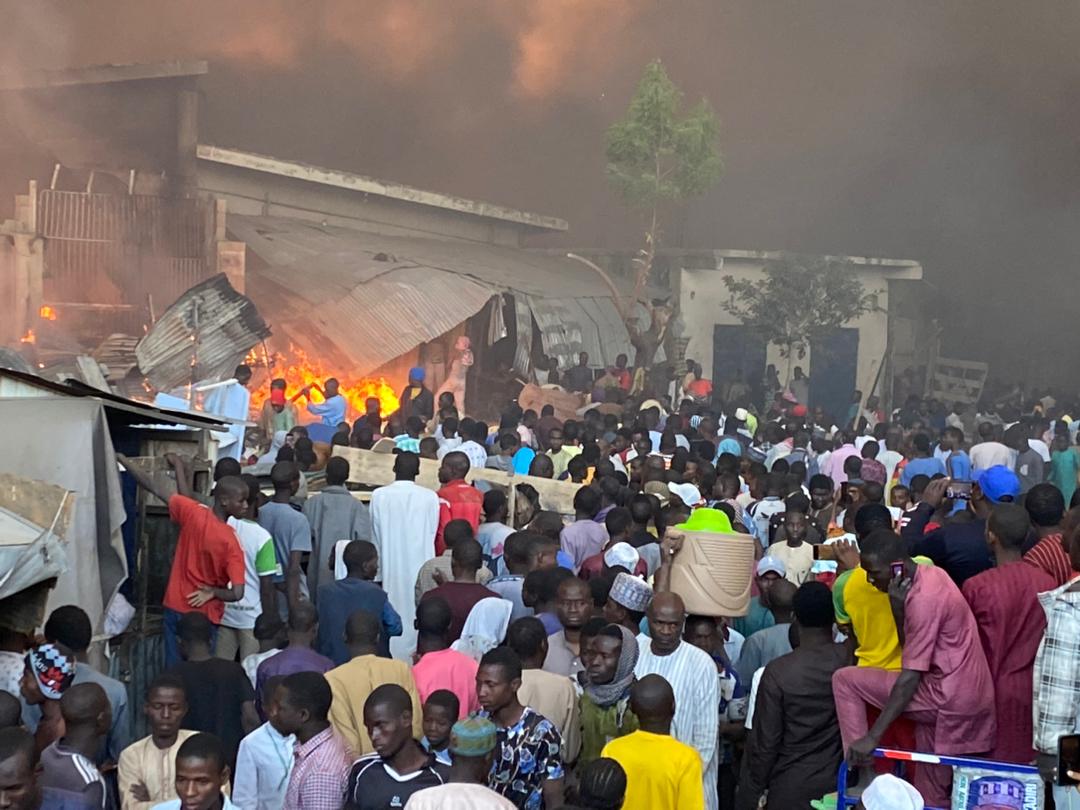Tragedy of Maiduguri Monday Market fire
The fire that razed the Maiduguri Monday Market, on that early Sunday morning, two weeks ago, was an unmitigated disaster, both to the Borno State Government that owns the market and, especially, to the thousands of traders that earn their daily livelihood there. It is, however, heartening to observe the avalanche of sympathy and support […]

Maiduguri Monday Market fire
The fire that razed the Maiduguri Monday Market, on that early Sunday morning, two weeks ago, was an unmitigated disaster, both to the Borno State Government that owns the market and, especially, to the thousands of traders that earn their daily livelihood there. It is, however, heartening to observe the avalanche of sympathy and support for all affected. I guess the massive financial and material support garnered so far will bring some succour to the traders and impetus to the reconstruction effort of the state government, which should begin in earnest.
Market fires are perennial events in this part of the country seasonally under the deleterious effect of the Harmattan, the November-March phenomenon, known for the dry northeasterly wind, always fast-moving and thus, susceptible to start fires of this kind. The present Monday market is itself sitting on the grounds of one that was burnt to ashes in 1979. The old market would be about half the size of the present one which was conjoined to the adjacent motor park to build the new market.
The old market has been there probably since the 1920s. I grew up in the late 1950s and early 60s to find it the busiest part of Maiduguri, particularly on Mondays when traders from all the surrounding villages on numerous donkeys, horses, camels and ox-driven carts would converge on the market. It was a well-planned market with adequately spaced stalls built with red bricks, the fashionable building material of the time. The market was shaded with tens of hundreds of neem, baobab and durumi trees.
I have fond memories of the old market which I associate with my childhood days. My father owned some stalls just outside the market, in the corn section, superintended by his brother, where we as children were wont to play among stacks of bags of corn to the discomfiture of the staff. Inside the market, my great uncle was a leader of the Yan Koli and I also knew many traders in all the nooks and corners of the market.
- Naira crisis: Oluwo empowers subjects with cash, food items, machines, others
- BREAKING: CBN has directed banks to dispense old notes – Soludo
Unfortunately, one afternoon in March 1979, the busy market went up in flames. I just got married that year and had become a regular visitor to the market to stock up on my foodstuff store. That afternoon, I had come into the town from where I lived in the CBDA Quarters on Gamboru road and was heading to the market. I was driving on the road from the Makera side towards the market when I observed people running helter-skelter and on looking up saw the smoke billowing ahead of me, overcasting the horizon of the approach of the market.
It was one of the worst disasters that affected Maiduguri in living memory, then. The market was razed to the ground sending thousands of trading families into penury. Some of the traders picked up their lives with savings here and there and moved to the Gamboru market. Unfortunately, a few months after, the Gamboru market too was visited by the same tribulations. The market also got burnt down. My great-uncle never recovered. Many other prosperous traders I knew personally across all trades, including Alhassan mai yadi, Mamuda mai gwanjo, and Madawaki mai atampa, all went down.
To make matters worse for the multitude who lost their stalls in the market fire, it took some time for the new market to become a reality. Col. Tunde Idiagbon, the Borno State Military administrator had his hands full with preparations for the elections to usher in the 2nd Republic. He was also busy preparing for the visit of the Head of State, General Olusegun Obasanjo, in July to inaugurate the South Chad Irrigation Project, New Marte. He had to leave the matter of the construction of the new Monday Market to his successor, Mohammed Goni, who took over as governor in October 1979.
It was not even clear if it was the place of the state government to deal with the construction of the new market as constitutionally markets and parks were schedules of local governments. Nevertheless, Governor Goni made it a priority project and went ahead with a six-million-naira loan from the First Bank of Nigeria. The construction of the new market dragged on for a couple of years. Though it was not completed at the end of his tenure in 1983, Governor Goni went ahead to inaugurate the new market in August 1983. Eventually, the market was officially commissioned in August 1985 by the Borno State Military governor, Major-General Abubakar Waziri.
The new market was an edifice to marvel at. It was the largest modern market of its time in the North, housing over 10,000 built-up stalls with tarred roads separating rows of stalls, large parking spaces for hundreds of vehicles, and offices for the managers of the market. You could drive into the market and conveniently transact any business and leave without hassle. Sadly, in due course, the managers lost control with the size of the market growing astronomically by the day. This uncontrolled growth is what afflicts most markets in the country making it impossible to battle fires whenever they occur.
What can be done to save our markets? We’ll return to the subject next week.
